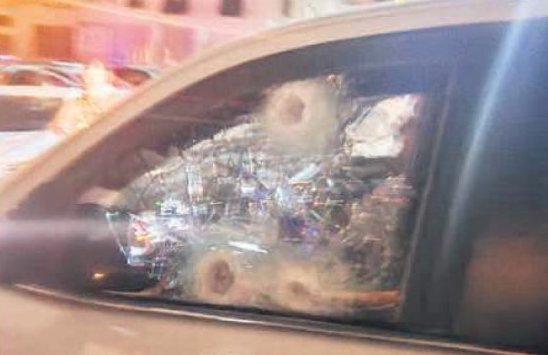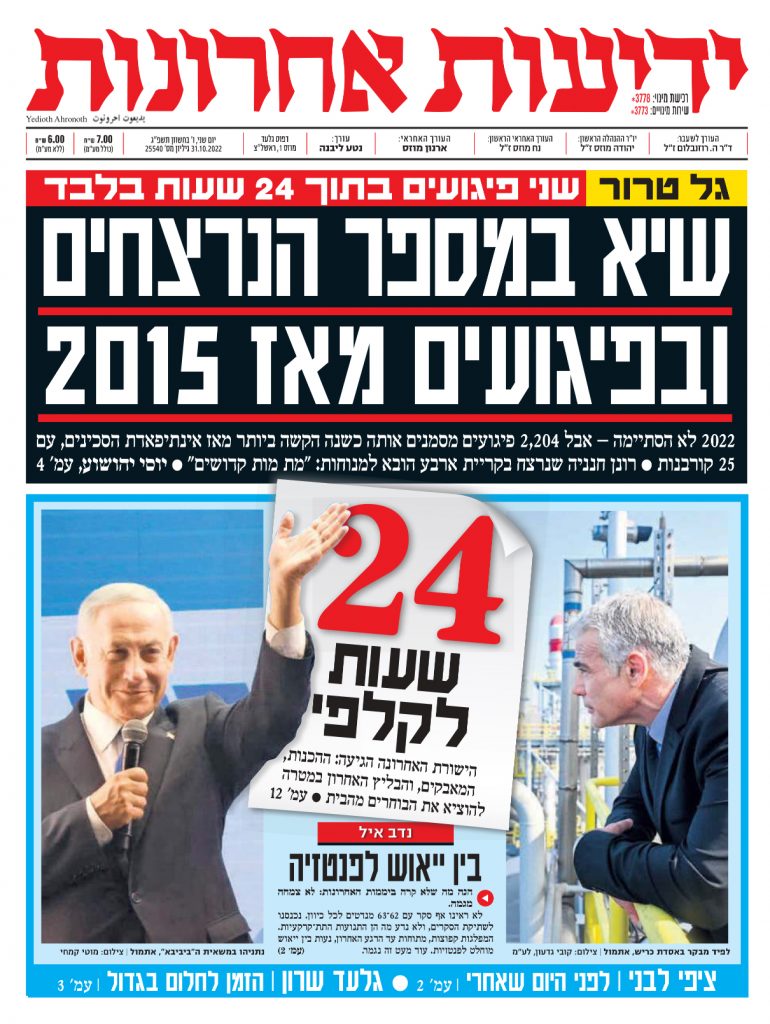FRESH AIR
Terrorism impact a wildcard in Israeli elections
October 31, 2022 | Ahron Shapiro

With the last polling before tomorrow Israel’s national election showing a dead heat between caretaker Prime Minister Yair Lapid-led centre-left unity government bloc, and Opposition Leader Binyamin Netanyahu’s Likud-led bloc, the question on everyone’s minds is what make could make this election different than the past four Israel has had since 2019?
One of the answers is that this election, unlike all the others, is being held under the backdrop of Israel’s worst wave of terrorism since the so-called “Knife Intifada” of 2015. Indeed, this is the cover story of today’s edition of Yedioth Ahronoth (October 31), Israel’s largest commercially sold newspaper.

Yedioth Ahronoth Oct 31: Top story (above) spotlights terror wave
According to the Page One story by journalist Yossi Yehoshua (Hebrew only), in the last ten months, Israel’s internal security agency Shin Bet has foiled 380 attacks. However, 25 Israelis have been killed. At the same time, 200 Palestinians have been killed – the vast majority of whom were terrorists killed in the act, or violently resisting arrest.
The 2,204 recorded attacks on Israelis this year to date (a figure which includes the stoning and attempted firebombing of cars, which is rarely covered by the media) is the highest number since 2015, the year of the “Knife Intifada”, when 29 people were killed in 2,558 attacks.
As Election Day approaches, attacks have not abated.
Within the crucial three-day window before the election – a time when the small number of remaining undecided voters in Israel make up their minds about which party to back in the polling booth – there have been two major terror attacks in the West Bank.
On Saturday night near Hebron, a Jewish man was ambushed and killed after leaving a grocery store, his son was wounded. First responders were also injured by the terrorist in the attack.
Then on Sunday, five Israeli soldiers were injured in a car ramming incident near Jericho.
Historically, terrorism has had the effect of moving some centrist voters to the right, and right-wing voters further to the right. In most respects, that phenomenon has been observed to be only temporary: When the terrorism wave ends, the political camps gradually return to their pre-terrorism levels.
When the terror wave coincides with an election, it can benefit the right-wing camp significantly. The best example of this was in 1996, when the Likud’s Binyamin Netanyahu rallied from a 20-point deficit to beat Labor’s Shimon Peres by a whisker after a series of suicide bombings and other traumatic terror events happened during the campaign.
The terror events of this year have been gradual enough not to have nearly the same effect, but it could certainly explain the stream of votes moving from the Likud to the major party on the far-right, Religious Zionism, led by Betzalel Smotrich together with Itamar Ben-Gvir of the Jewish Power party.
Israeli commentators: Internal security issue a potential election gamechanger
Even before the most recent attacks and even aside from the terror wave itself, Israeli commentators and analysts had identified the diminishing Israeli sense of security within their country as an issue that had resonated with voters in surprising places.
It may reveal itself to be the single most important issue in getting a significant number of voters that have voted with the anti-Netanyahu bloc in the previous elections to consider changing their vote in this round.
In a story (Hebrew only) entitled “In the North, in the South, there is no center” with an intro “The extortion, the hooliganism on the roads, the bullying: Those who want to understand the votes pouring out of [Benny] Gantz’s [centrist National Unity] party to [Religious Zionism party’s extremist co-leader Itamar] Ben-Gvir – should visit the Upper Galilee kibbutzim”, Yedioth Ahronoth analyst Amichai Atali shed light on the desperation of farmers who have been victimised by criminals from the Israeli Arab sector who have been shaking them down for protection money.
In the story, Atali writes about visiting an unnamed, secular kibbutz in Israel’s North, a community that has historically voted for Labor, Meretz or for a mainstream security-minded party, and finding people who say, off the record, that they are considering voting for Religious Zionism and Ben-Gvir, precisely because he is promising to restore security for their communities and has no prior experience (or failures at the job).
Another Yedioth Ahronoth writer, Nadav Eyal wrote about a similar topic on Friday (Hebrew only]. Eyal wrote:
“Do you know what the message is getting to us from the farmers, apart from the matters of land, imports, water prices?” A source from the National Unity party asked me.
“That Ben-Gvir, unlike the other politicians, does not show up just for elections. That he is constantly interested in agricultural crime, which embitters their lives. That they may not vote for him, but they want Ben-Gvir to put things in order.”
For his part, Yedioth Ahronoth columnist Amit Segal wrote (Hebrew only) about the lasting electoral impact of the traumatic sectarian violence in mixed Jewish and Arab cities like Lod and Acre during the Gaza escalation of 2021 known within Israel as “Operation Guardians of the Walls”:
“Itamar Ben-Gvir held a single mandate in the Knesset last year. Today the religious Zionist list wins 13 mandates in the polls, most thanks to him. What has changed? “Guardian of the Walls”. Almost everything that happens in this election is a result of the riots in the cities involved last year. Ben-Gvir takes mandates from the Likud because he does not carry on his back the anger [towards Netanyahu] for turning a blind eye [to growing internal security problems] for many years, and [also takes] quite a few votes from centrist voters because of his clear and unequivocal line.”
Interestingly, Segal sees a political parallel to Ben-Gvir’s rising fortunes in the form of a growing number of Israeli Arabs considering voting for their most extremist anti-Zionist party, Balad.
Finally – and AIJAC readers who are not fluent in Hebrew will naturally appreciate this – Ha’aretz English columnist Israel Harel has written about the internal security issues that are fuelling support for Ben-Gvir in this election. In the article headlined “how to stop Ben-Gvir”, Harel says that calling Ben-Gvir’s voters racist isn’t going to achieve anything. Instead, there has to be recognition of Israelis worried about their internal security and more action taken to address the problem.
Harel writes:
“Most of the population, Jews and Arabs alike, is either horrified by or, at least, disagrees with MK Itamar Ben-Gvir… [But] my understanding is that the loss of governance in the Negev, the Galilee and the West Bank is the main factor driving votes from Benjamin Netanyahu to Ben-Gvir (since Netanyahu, during his multiple terms as prime minister, neglected this critical issue). Even some leftists, such as farmers whose produce, sheep and cattle are being stolen and whose packaging houses are being torched, have said they will vote for Ben-Gvir… The only way to stop Ben-Gvir is by thoroughly addressing, in a way that produce demonstrable results, the lack of governance and all the other issues on which he expresses many people’s genuine distress.”
RELATED ARTICLES

‘Time’s up for talk’: Joel Burnie discusses Antisemitism Envoy’s report on Sky News

‘Optimism’ for Hamas to ‘exile’ their power and create a permanent ceasefire with Israel: Joel Burnie on Sky News

Australian government’s response to Iran-Israel conflict ‘disappointing’: Paul Rubenstein on Sky News




















